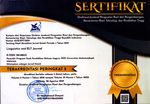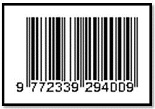Cultural Survival and the Postcolonial Imagination: A Fanonian Reading of Chinua Achebe's Things Fall Apart
Abstract
Keywords
Full Text:
PDFReferences
E. W. Said, The World, the Text, and the Critic. Cambridge, Massachusetts: Harvard University Press, 1983.
R. P. Chapagaee, “The Cultural Erosion: Post-Colonial Discourse in Achebe’s Things Fall Apart,” Int. J. Humanit. Educ. Soc. Sci., vol. 2, no. 1, pp. 98–110, Feb. 2024, doi: 10.58578/ijhess.v2i1.2696.
G. Aras and S. Takva, “Tracing Colonial Ideology in Chinua Achebe’s Things Fall Apart and Buchi Emecheta’s The Bride Price,” J. Int. Soc. Res., vol. 15, no. 84, Jan. 2022, [Online]. Available: www.sosyalarastirmalar.com
G. KARA, “The pen and the plow: Chinua Achebe’s Things Fall Apart and the reimagining of African culture,” RumeliDE Dil ve Edeb. Araştırmaları Derg., no. 36, pp. 1362–1374, Oct. 2023, doi: 10.29000/rumelide.1369607.
S. A. Omer and S. Shafi’ Babo, “Impact of Colonialism in Chinua Achebe’s Things Fall Apart,” Salahaddin University, Erbil, 2024.
A. K. M. A. Rashid, “Re-reading Chinua Achebe’s Things Fall Apart: A Postcolonial Perspective,” Int. J. Linguist. Lit. Transl., vol. 1, no. 4, pp. 1–7, Nov. 2018, doi: 10.32996/ijllt.2018.1.4.1.
A. A. S. Altobbai, “The Paradox of Cultural Decolonization through the Colonizer’s Language in Achebe’s Things Fall Apart,” Int. J. Stud. English Lang. Lit., vol. 8, no. 5, 2020, doi: 10.20431/2347-3134.0805002.
A. Campu, “The Clash of Culture in Chinua Achebe’s Things Fall Apart: The Western Influence,” J. Rom. Lit. Stud., no. 16, 2019.
F. Fanon, The Wretched of the Earth, English. 841 Broadway New York, NY 10003: Grove Press, 1961.
L. . Moleong, Metodologi Penelitian Kualitatif . Bandung: PT. Remaja Rosdakarya, 2011.
C. Achebe, Things Fall Apart, 50th Anniversary. New York: Anchor Books, 1994.
S. V. Gallagher, “Linguistic Power: Encounter with Chinua Achebe,” Christ. Century, vol. 114, no. 9, pp. 260–261, Mar. 1997, [Online]. Available: https://www.enotes.com/topics/things-fall-apart/criticism/criticism/susan-vanzanten-gallagher-essay-date-12-march-1997
R. Rabaka, Forms of Fanonism, English. Lexington Books, 2010.
C. Achebe, Morning Yet on Creation Day. London: Heinemann Educational, 1975.
B. Eldon, “Fanon’s Fanboys: How the Violent Decolonization Movement was Brought to Canada,” C2C journal.
DOI: https://doi.org/10.31764/leltj.v13i1.31861
Refbacks
- There are currently no refbacks.
Copyright (c) 2025 Ida - Puspita

This work is licensed under a Creative Commons Attribution-ShareAlike 4.0 International License.
_____________________________________________________
Linguistics and ELT Journal
p-ISSN 2339-2940 | e-ISSN 2614-8633

LELTJ is licensed under a Creative Commons Attribution-ShareAlike 4.0 International License.
_____________________________________________________
LELTJ is abstracting & indexing in the following databases:
_____________________________________________________
LELTJ Editorial Office:













